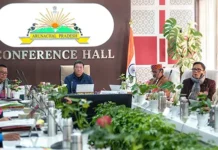Flights Of Fantasy
[ M Panging Pao ]
The coronavirus pandemic around the world has brought into focus the human fragility to contagious viruses and bacteria despite advances in medical sciences. The coronavirus has spread across the world rapidly due the world being more closely connected by advances in transportation network like flights, ships, etc. A few cities and countries are under total shutdown, ships are quarantined, and entire families are living in isolation due to the virus.
Research reveals that the virus spreads through droplets from infected persons via physical contact from contaminated surfaces, clothes, etc. After touching contaminated surfaces, contact with mouth, nose or eyes infects the person. The other major way the virus is spread is through handshakes.
Handshakes are a globally accepted form of greeting, especially in the western world. The handshake is believed to have originated during 5th century BC in ancient Greece as a gesture of peace by demonstrating that the hand holds no weapons. Handshakes are said to symbolize personal intimacy by touching, and sometimes manliness also!
Other forms of greetings, like bowing, namaste, waving, aadaab, fist bumps, high fives, hugging and cheek kissing are followed in various parts of the world. In militaries, saluting each other is the accepted form of greeting. Bowing, namaste and aadaab are mostly followed in Asia.
Handshaking can transmit many pathogens (bacteria, viruses, microorganisms) which can cause diseases like cold or flu, scabies, Hepatitis A, eye infection, diarrhoea, etc.
One of the ways to avoid infection through hands is to frequently wash hands with soap and water or with alcohol-based hand sanitizers. The other way is to avoid touching mouth, nose and eyes with hands. With the ongoing coronavirus pandemic spread over 110 countries, including India, shops have run out of alcohol-based sanitizers, face masks and tissue papers.
Health practitioners are advising to avoid handshakes, hugging, cheek kiss, etc, to avoid spreading infections by contact. It is healthier and hygienic to adopt other methods of greetings, like namaste, aadaab, bowing or saluting, which avoids body contact.
Traditionally, native tribal people never shook hands as a form of greeting. Shaking hands has been picked up in the last few decades from the British and other outsiders. Presently, shaking hands is a common form of greeting prevalent in the entire state.
The ongoing coronavirus panic and hysteria have been aggravated by the widespread penetration of social media among the population. However, we must recollect that more people are dying due diseases like dengue, tuberculosis and HIV-AIDS, and in road accidents.
There is one important lesson from this pandemic: human beings are very fragile to the forces of nature. In many cases, humans are helpless against the onslaught of nature. Therefore we must learn to respect and preserve natural habitats and ecosystems. To stop spreading the coronavirus, isn’t it time for us to start doing ‘Namaste Arunachal’ or ‘Namaste India’? (The contributor is retired Group Captain, Indian Air Force)




